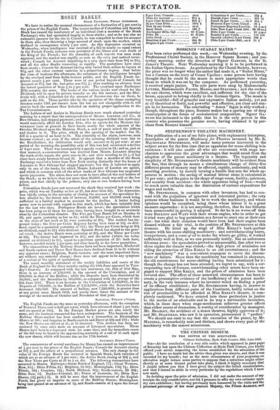STEPHENSON'S THEATRE MACHINERY.
THE publication of a set of ten folio plates, with explanatory letterpress, descriptive of the patent Machinery for Theatres invented by Mr. R. MACDONALD STEPHENSON, will make many persons interested in the subject aware for the first time that an apparatus for scene-shifting lain existence : it will also enable all who are conversant with stage me- chanism to appreciate the great advantages that would result from the adoption of the patent machinery in a theatre. The ingenuity and simplicity of Mr. STEPHENSON'S theatre machinery will be evident from
the fact, that through its means a simultaneous change of thirty-five different pieces of scenery may be effected, rapidly, noiselessly, and with unerring precision, by merely turning a handle that sets the whole ap- paratus in motion : the saving of manual labour alone is calculated at 70 per cent ; and the gains in the shape of stage-room, facility, quietness, and security from accident—the whole apparatus being of iron—would be much more valuable than the diminution of current expenditure for wages and tackle.
Mr. STEPHENSON, in common with other inventors, has had to con-
tend with the prejudices of ignorant and interested parties; the very persons whose business it would be to work the machinery, and whose opinions would be consulted, being those whose labour it in a great measure supersedes : it is not surprising, therefore, that he has hitherto been unsuccessful in getting it adopted. So far he is no worse off than were BOULTON and Warr with their steam-engine, who in order to get it tried were glad to beg permission as a favour to erect one at their own cost: but what their situation would have been had their engine been disused without a fair trial, is the position of Mr. STEPHENSON at this moment. He fitted up the stage of Miss KELLY'S back-parlour theatre with his scene-shifting machinery; and notwithstanding hurry, inexperience, and a want of oil to make the wheels go glibly, it worked sufficiently well at first, as we can personally testify. But an unforeseen dilemma arose : the speculation proved so unsuccessful, that after two or three nights the theatre was closed,—the high prices of admission not aiding the attraction of Miss KELLY in an old entertainment ; and the "new machinery" was a convenient scapegoat to cover the discom- fiture of failure. Since then the machinery has remained in abeyance, the old contrivances for scene-shifting having been substituted for it : though the change has not been attended, we regret to say, with a cor- responding turn of fortune, notwithstanding other actors have been en- gaged to support Miss KELLY, and the prices of admission have been lowered also. The effect of these untoward circumstances has been to create a presumptive evidence of the inefficiency of the patent machi- nery, in the very instance where its inventor relied on finding a proof of its efficacy established ; for Mr. STEPHENSON having, in answer to applications from different parts of the Continent, boldly relied on the test of practicability to be afforded at Miss KELLY'S theatre, is com- pletely cushioned. We have entered into these particulars in justice to the merits of an admirable and in its way a serviceable invention, which, in these days when stage-mechanism achieves greater effects than either actors or dramatists, is worthy of consideration by managers. Mr. BEAZLEY, the architect of a dozen theatres, highly approves of it; and Mr. STANFIELD, who saw it in operation, pronounced it "perfect."
We should not omit to say that the execution of the plates, by Mr. MANSELL, is remarkably neat and distinct, and shows every part of the machinery with the utmost minuteness.


























 Previous page
Previous page